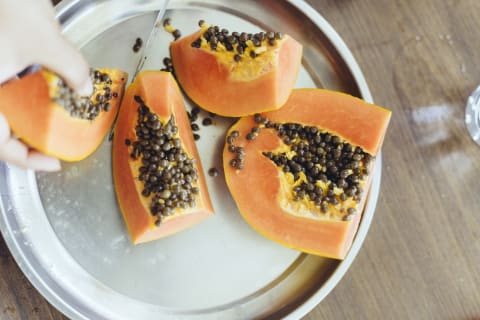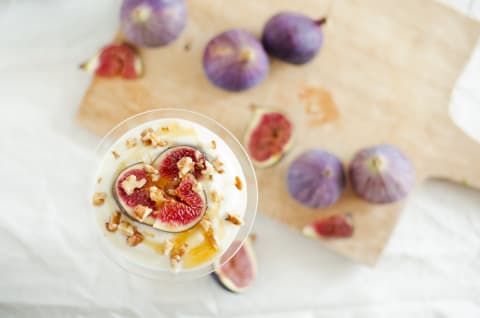Advertisement

If you’re looking to shed that extra layer of leftover winter (and spring) bloat, making your gut happy could be the step you’re missing. Your gut—also called the microbiome—comprises organs that digest food and is full of microbes like yeast, fungus, and bacteria that can help (or hurt) the process. Keeping the “good” microbes happy and the “bad” ones at bay is key to controlling cravings, fat storage1, maintaining a healthy weight2, and even boosting happiness.
Other research shows that an out-of-balance microbiome could lead to weight gain, obesity, cravings, and other health conditions, so it’s important to keep it in tip-top shape. Here are our recommendations for keeping your gut happy and healthy for your best summer gut ever.
1. Check on your vitamin D.

Did you know that about half the population is deficient in vitamin D? Fifty percent of Americans aren’t getting enough of this nutrient—and hormone—essential for cellular growth and repair. Whether you get it through supplements or food (ideally, both), it’s foundational to good gut health. Researchers have discovered that vitamin D may play a key role in the communication between your body and your microbiome—that’s a connection you don’t want to disrupt!
2. Meditate.
Chronic stress has been shown to adversely affect3 gut health. One proven way to crush anxiety and stress for the long haul? Meditation. Even sitting for 10 minutes a day is enough to rewire your brain and bring stress levels down4. If you’re new to the practice, try downloading a meditation app or a guided yoga nidra relaxation practice. Keep calm and carry on.
3. Take a probiotic supplement.
Taking a probiotic is a gut health no-brainer. We like Healthy Directions ,because it includes seven strains of beneficial bacteria specifically designed to help improve digestion. A probiotic supplement can help undo the harsh microbiome wipeout caused by antibiotics you’ve taken in the past, bringing your gut back into balance. It’s also a proactive measure to help support your microbes in keeping your metabolism and digestion humming on the daily.
4. Snack on hydrating prebiotics.

If you’re starting to take probiotics, prebiotic plants5 help them work better. Papaya and pineapple are two fruits that work wonders in your gut based on the acids and compounds they contain, but they’ll also help boost beneficial gut microbes by providing them with fiber, which good microbes love to “eat.” Papaya contains6 naturally anti-fungal, anti-inflammatory, neuroprotective and healing properties, while the bromelain in pineapple7 helps keep candida at bay.
Another great summertime option? Blueberries! Polyphenols from these tiny fruits can improve your microbiome, fighting against degenerative disease.
5. Spend time outdoors (and with Fido).
Spending time outdoors is an excellent antidote for stress, but soothing your nervous system from its sympathetic “fight or flight” mode and bringing it into “rest and digest” parasympathetic state benefits your gut, big time. Make it even better by bringing your pup along for the hike—research shows that dog owners had more than twice the amount of microbial diversity than non-dog owners, which means people with dogs tend to have better gut health. Thanks, Fido!
6. Sip kombucha.
Kombucha, or fermented tea, is loaded with beneficial gut bacteria. In fact, each bottle should have a colony, or a slab of slime, which is the bacteria—aka a SCOBY. That’s how you know it’s the good stuff. Enzymes and acid from the fermentation process will also make your gut happy and help your digestive system reset.
7. Avoid gluten.
Gluten, a lectin, is a known gut disruptor. Of course, you don’t have to give it up forever if you’re not intolerant! But if you’re trying to show your gut some love, skipping it for a day or two can help rejuvenate your microbiota8. If you want to have your gluten and eat it too, try sourdough bread. Old fashioned sourdough is created using fermented yeast, which breaks down some of the gluten in flour and leaves out the additives in commercial bread that can cause bloating and inflammation.
8. Sleep in.
Don’t need to tell us twice! But really, not getting enough shut-eye can actually create distress in the gut. Research shows that creating artificial jet lag9 in mice leads to weight gain because of the chain reaction started by hormonal disruption caused by lack of sleep. Prioritize your sleep this summer if you want to put your best gut forward.
9. Try full-fat yogurt.

The active cultures in yogurt have been our microbial friends10 for a long time. But doesn’t dairy cause distress to the gut? Try a full-fat version. Oftentimes, the processing required to make yogurt low-fat or fat-free can cause digestive upset, but the full fat version is easier on the stomach, loaded with beneficial bacteria, and contains less lactose. Plus, research has linked full-fat yogurt to a healthy physique11. We like this one.
Armed with these tips, your gut will be summer-ready in no time.
11 Sources
- https://www.ncbi.nlm.nih.gov/pmc/articles/PMC3263193/
- https://www.ncbi.nlm.nih.gov/pubmed/27149163
- https://www.ncbi.nlm.nih.gov/pubmed/22314561
- https://www.ncbi.nlm.nih.gov/pubmed/24395196
- https://www.ncbi.nlm.nih.gov/pmc/articles/PMC3705355/
- https://www.ncbi.nlm.nih.gov/pmc/articles/PMC3984819/
- https://www.ncbi.nlm.nih.gov/pubmed/11410400
- https://www.ncbi.nlm.nih.gov/pmc/articles/PMC3667473/
- https://www.ncbi.nlm.nih.gov/pmc/articles/PMC3632337/
- https://www.ncbi.nlm.nih.gov/pmc/articles/PMC4027835/
- https://link.springer.com/article/10.1007%2Fs00394-012-0418-1
